Don't wanna be here? Send us removal request.
Text

These lines (first from the films, thereafter from the books) taught me something profoundly essential about how to be there for a friend, a lover, or a loved one when they are consumed by despair, weighed down by grief, or overwhelmed by the weight of mental torment. It taught me that some burdens are sacredly personal; untransferable tasks that each of us must face in our own time and way.
Yet, while we cannot take their pain or carry their burden for them (no matter how much we wish we could), there is something else we can do. While we cannot lift their burden, we can lift them. We can carry their weary body, their weary heart, as they bear the weight of their pain. In doing so, we offer them a sanctuary — a place of care and safety, where they can begin to confront their hurt without the fear of being alone in its gaze.
While the pain may be theirs to bear, the journey through it need not be traveled in solitude.
John Ronald Reuel Tolkien, I love you.
6K notes
·
View notes
Text
is anyone else disgusted by the enormity of their desire or is it just me & richard siken
28K notes
·
View notes
Text
I dont care about anyone not liking me you bitches barely like yourselves
66K notes
·
View notes
Text
Vedic Astrology Observation (based on shows/films part 6)


Rewatching "Nevertheless" and yeah Song Kang's character here is definitely more Ketu than Solar. You want to watch his Sun nakshatra coded characters? Watch "My Demon", watch "Love Alarm". He specifically channels his Uttara Phalguni Moon in the "My Demon" especially, and his love interest is also an Uttara Phalguni. But "Nevertheless"? That is a whole nother nakshatra lord influence.

I'm going to touch on this very infuriating character. The reason why I changed my mind on what energy he is channeling the most is because of Claire Nakti's Ketu Dom Men video. He fits the negative descriptions (minus being an exploitative cultist, he's just a nonchalant, very mysterious draining parasite). 😭

Every time a woman interacts with a Ketu man, she's so energetically and subconsciously pulled in by him (as is everyone), that she thinks she's gaining something from the experience but she leaves realizing how much she's depleted herself into him. But she's so subconsciously pulled in that she keeps coming back every time.
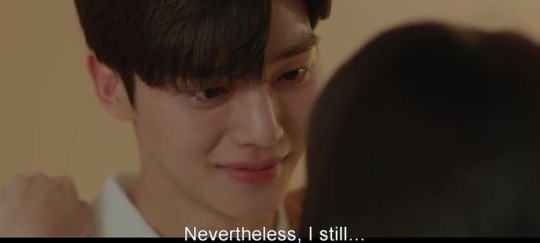
Ketuvians are not necessarily known for being givers unless there's some other placement. But the emotions and excitement they evoke in others makes those people think they're receiving energy, when actually its their own energy shaking up and being extracted from them.

This character will play into his magnetism, pull people in, then they'll realize they're only one of the many he subconsciously (sometimes even deliberately) pulls energy from. Since Ketu wants to absorb everywhere, it makes sense seeing him breadcrumbing and stringing the female lead along while he keeps his numbers of chasers in his pockets (this trait is exaggerated in them being cult leaders or them liking to maintain large followings to extract more energies (again, sometimes they don't do this intentionally. look at magha native michael jackson's effortless effect on others)). Another reason why I think he's channeling his Ashwini Sun the most is because of his fear of commitment. Although it's more apparent in Ashwini women, the wild horse here doesn't want to settle down ever. His overall detachment to such things, the story leaving him mysterious (despite the ending) because we never go into his depths but we rather see him be this attractive sucking void that eventually becomes sickening to other women he strung along... The difference is, though Solar men can be womanizers, women often gain status and validation in association with them. With Ketu men, nothing much is gained, which is why they eventually become frustrating to women who'll then walk away.

Another obvious thing, Ketuvians are mostly seen in spiritual spaces, learning about history or being into research, getting into interesting underground subcultures, and especially the arts. He "falls in love" (I don't believe that for one bit but sure) with a Vishakha Sun, Bharani Moon – Vishakha women dominate the arts and Bharani being a Venus nakshatra makes sense for her artistry.

Being Jupiterian, she's quite meek and relatable. I believe the actress was channeling Vishakha, as its a nakshatra about transformation, and I believe her purpose in this story is finally standing up for herself to break free from the pattern of reliving a situation. But because of polarity, Ketu and Jupiter will always be drawn to each other unfortunately. The best match for Ketu men is no one, in my humble opinion, though. They usually don't care about that anyway unless there's something to gain. They're quite similar to Ketu women. I've seen them be their best version with Ketu women. I could name a few examples of Ketu dynamics in fiction which don't have this exploitative aspect that Jupiter x Ketu pairings (platonic or not) usually do. There is a quiet understanding between the Ketu characters and a natural inclination to protect one another without even getting close, because of this unspoken connection they have. Such as in "Sweet Home", where Song Kang channels his Ketu energy yet again.
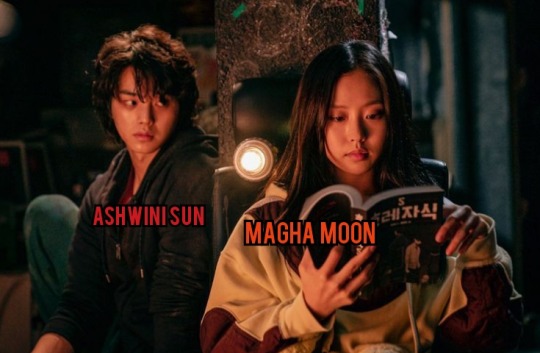
He is drawn to the inwardly conflicted Magha Moon native Go Min-si. And due to his isolation, their connection isn't seen as them getting physically close, but there is something that is just tying them together.
In the kdrama "Save Me", where the Ketu male characters find themselves tied back to a Ketu girl. They are all tied by some kind of destiny that pulls them back to when they met. Despite the gap between them, this undeniable connection has them teaming up to save her from a cult.
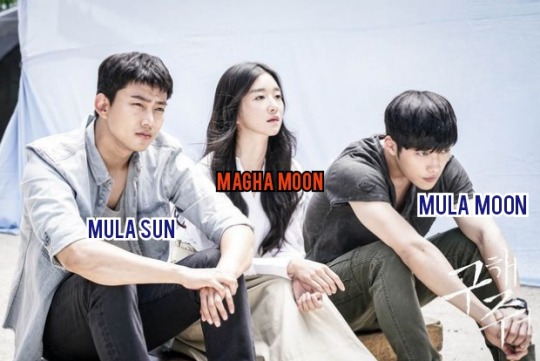
And, interesting enough, the cult leader who cruelly exploits the Ketu woman, and everyone else in his cult, is played by a Ketu native.
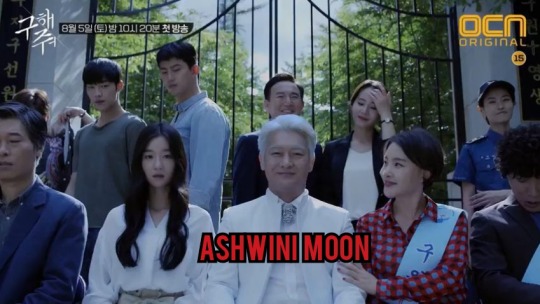
This powerful, subconscious connection between Ketuvians (in these fictional depictions) is so interesting as the characters usually keep at a distance from each other initially, never having to get close to feel each other — the connection is just naturally present. I specifically caught this when I rewatched the film "Through My Window", starring two Ketuvians.
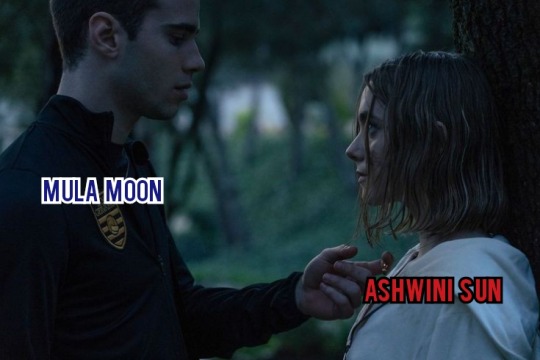
The Ashwini native here has an odd fixation on the Mula native. She stalks him and observes him from afar without ever getting close enough to meet him. But then when he catches her, a scene in the graveyard, he makes her aware that he knows. He would know that she's been unconsciously pulling energy from him (note, he also has Punarvasu Sun; Ketu x Jupiter strikes again, but his approach to her and their interactions are primarily Ketu x Ketu as he strings her along and she does the same and strings him back). As Ketuvians are so in tune with the energies within themselves, they'd notice if someone were extracting energy from them on a subconscious level. His intuition, and her Ketu tendencies of absorbing him from afar, already tell us how Ketu would interact amongst itself. I could think of another stalking dynamic between two Ketuvians, from "Marvel's Jessica Jones".
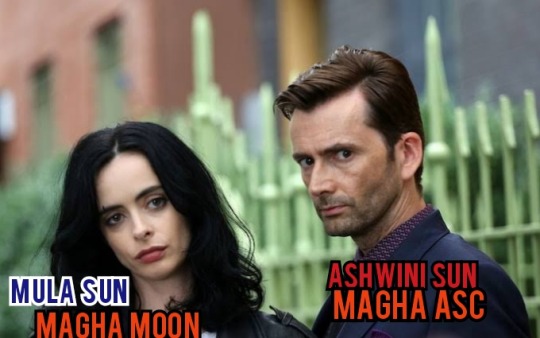
The Ashwini here is yet again obsessed with the Mula native. He used his superpowers to force her to be in a relationship with him and even after she escapes from his clutches, he means to regain his control over her to prove that she can love him willingly; yet again trying to drain her (very important to note that she also has Purva Bhadrapada ASC (Ketu yet again draining Jupiter)).
In the film "Girl With The Dragon Tattoo" starring two Ashwini natives, we see these characters form an unconventional bond – both having deep intrigue for each other, which is usually how these Ketu characters regard each other initially. It's not romantic, lacking that Venusian quality of romance we usually see. Instead it's a very rare, complex affection and connection that neither of them can explain in words.
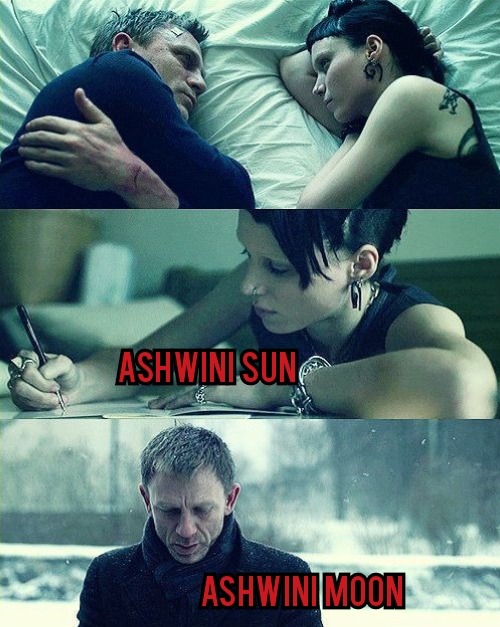

It always seems as if almost every Ketu character drawn to each other can't just have a long-lasting "relationship". In fact, trying to reduce their indescribable connection to a mundane romantic relationship doesn't do them justice. Ashwini natives aren't typically relationship-orientated, anyway.
Usually a romance between Ketuvians in fiction can be depicted as ethereal, intense and just as short-lived, such as in the film "Meet Joe Black". A love that is shown to transcend time and reality, and so temporary and fleeting.
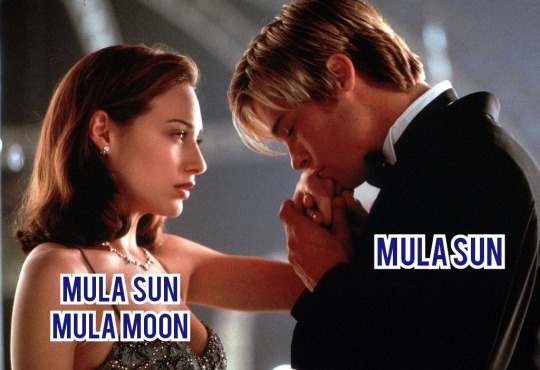
The film needs an analysis of its own as it stars three Mula natives as its leads. But Ketu here reminds us how fleeting existence is. The Mula Sun native playing Death himself, in parallel to how Ketu can drain and take important things or people away. Death is drawn to a double Ketuvian woman, who happens to be the daughter of the man he is taking away to the afterlife.
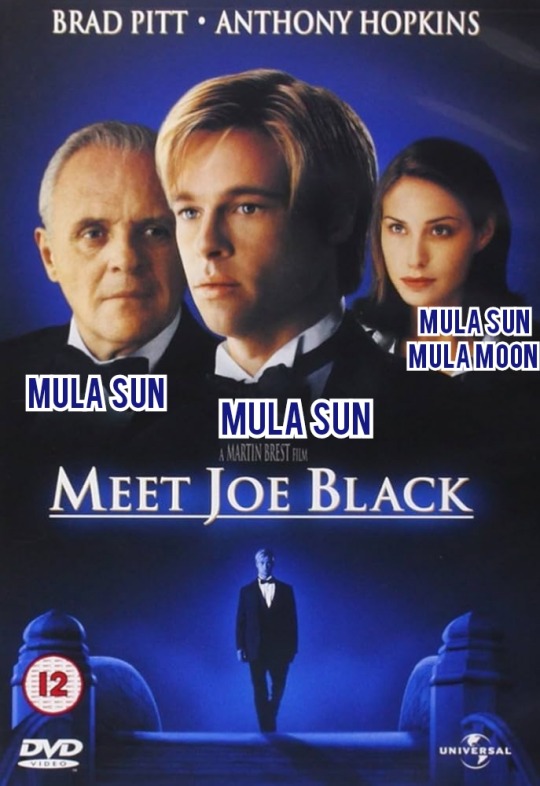
The Ketu woman is specifically drawn to his mystery and his innocence, sensing something off about him yet being pulled in by his innocent mysticism. A very bittersweet relationship develops between them that has this looming reality that he is not human and something inevitably heartbreaking is soon to take place. Very much getting into 8H themes, unsurprising as Ketu co-rules the 8H.
129 notes
·
View notes
Text

Anna Akhmatova, from A Stranger to Heaven and Earth: Poems of Anna Akhmatova; "Farewell Song,"
7K notes
·
View notes
Text
I need to grow out of this shell i'm in. It's time to change.
0 notes
Text
She gave me her devotion and I gave her my obsession.
1K notes
·
View notes
Text
Wanna have a pretty boy blowing up my phone with pictures of him doing random things since he's bored. Him at the bookstore, the groceries, making food, stroking his cock, humping a pillow or crying because nothing feels as good as Mommy
928 notes
·
View notes
Text
ur very cute and very far away please come be cute closer to me
317K notes
·
View notes





